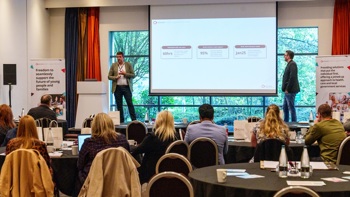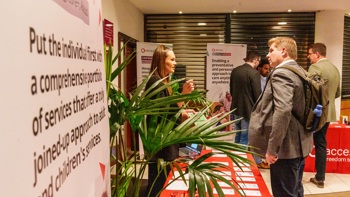
Session 1: LG Commissioning Roadmap & Strategy
After our intro by our General Manager for Local Government and TEC, Andy Sparkes, two of the tallest men alive in Chris Wilson (Product Director Integrated Care) and Edward Beesley (Senior Product Manager) kicked the day off with a look at the social care market; diving in on the macro-economics of provision and commissioning.
The talk highlighted one big fact: there is forecasted to be a £6 billion shortage in funding over the next two years. This is a problem driven by reduced central government funding, inflation, and the need for a living wage for care staff.

The Access Group’s response focuses on the above principles. The care industry has a lot of challenges. Analogue administrative and operational processes are time-consuming and repetitive, making them susceptible to human error and tricky to communicate or share. Hospitals are the current go-to for care still, and this is reactive support.
Our proposal, achieved through collaboration, is for continued digitisation so there’s a solid foundation of technology to rely on for functionality, a move away from hospital-first care to community-based support, and prevention rather than reactive care provision – something also achieved through greater awareness, patient record accuracy, and earlier engagement by professionals.
Chris and Ed highlighted how The Access Group has something for every part of the commissioning cycle, with Technology Enabled Care (TEC) and Elemental for prevention, Adam Care Commissioning for procurement, PAMMS for contract management, Access CM and Provider Portal for contract monitoring, and Mosaic for case management and finance.
Linking this all together through is The Access Group’s new proposition – IntelliCare. This is a platform and hub for creating a fully holistic take on a person’s wellbeing, and will function on top of existing products. Its purpose is to amalgamate data from each solution to generate more advanced data; data that can then provide insights in the form of habits or patterns or evidence of deteriorating condition.
Session 2: Big picture, Big Innovations! – AI & Data
Ed Beesley continued to hold court on the stage, this time turning our attention to artificial intelligence (AI) and the impact – and importance – it holds for data capture and analysis.
AI tools like ChatGPT aren’t new anymore, but their trustworthiness and ethical usage is a concern. As Ed pointed out in his presentation, sci-fi media has warned us off with movies like The Terminator and 2001: A Space Odyssey.
Fortunately, The Access Group is lucky to boast Alan Payne (Group Product and Engineering Director) amongst our ranks. An Honorary Professor in Intelligent Systems at UCL and a guest lecturer at Oxford University AI for their Adult Social Care forum, Alan founded the Ethical AI Guild to provide oversight and best practice. He has been responsible for both the creation of our Internal AI Policy at Access, but also our regulatory compliance commitment.
This has been hugely important because of the development and imminent rollout of Access Evo; our AI experience that will work within all products to enhance functionality and this is where Chris Wilson stepped back in. In Chris’ words, Data as a Service (DaaS) can be the solution for processing the large volume of care data, and AI is the tool that will navigate the complex nature of varied types of information, at a speed that allows it to be useful for commissioning and brokerage.

Session 3: Customer Spotlight – London Borough of Sutton
After lunch came the turn of Nerys Hebdon (Head of TEC Customer Enablement) and Bradley Coupar (not that one) - Tech Enabled Care Services Manager for the London Borough of Sutton.
Their talk focused on the benefits of technology-enabled care (TEC), and showcased the Access Assure home hub and other devices for the impact they have as traditional reactive monitoring equipment but also as future-friendly devices to aid preventative care action.
Bradley spoke about how London Borough of Sutton switched to TEC for better service delivery, more accurate records, better data insights, and generally the desire to be more preventative and supportive within the community setting, but it was Nerys who highlighted the forecasted return on investment that a partial telecare system or full, preventative TEC could have: a staggering 150% and 450% respectively.
Session 4: Customer Spotlight – Lancashire County Council
More customer focus followed, with Victoria Tomlinson (Senior Commissioning Manager) from Lancashire County Council speaking on how her team have had to deal with a disjointed approach to care management. Multiple methods, metrics and approaches were being used because of clashes in procedure between county, borough and local councils – as well as the local ICB.
Victoria spoke about wanting ‘one version of the truth’, something that has been echoed in health and care provision by many of our clients, and is part of why Access solutions are designed to be interoperable and collaborative so that a centralised, longitudinal record can exist.
Partnership work has proved difficult, but the increased efficiencies seen from implementing Access products have delivered improved care and cost savings, with the knock-on effect that Lancashire County Council can now look at widening their scope of data monitoring to get an even clearer picture of the needs of the local community – something that will only benefit their forecasting and planning.
Session 5: Transforming Prevention: The Future of Data-Driven Wellbeing
Joshua Taylor from the Access Elemental Team was up next to speak about effective prevention, and the three pillars of community engagement, data-driven public health, and citizen empowerment.
Patient engagement and patient activation are subjects that we at Access have written about extensively within the last year due to how much of a win it is for people to feel like they are a part of their own healthcare, so it’s no surprise that this is being tied in with AI and data analytics.
Access Elemental social prescribing is our wellbeing platform, with a Marketplace as our directory of services, a Case Management System for health and wellbeing teams, Connector Plus (a third party integration engine), and Analytics for the data-driven decision making.
Josh reiterated the goal of all the above: to utilise third-sector services and voluntary groups so as to develop local support networks and properly establish community health. Backed by real-time data and insights, people can be helped to help themselves, without needing to enter the front door of clinical or social care services.
Session 6: Making Outcomes Based Commissioning a Reality
Last but not least was Mark Kennion (LG Commissioning Sales) to round out the afternoon and reiterate the game-changing impact that IntelliCare will have on local government commissioning.
Mark spoke about the big challenge that is discharge into re-enablement. Discharge leads to brokerage, care delivery, the need for outcomes review, and a step-down in care provision intensity in due course. IntelliCare operates alongside these, handling aspects like records, brokerage, and reporting.
The goal, in his words, is to move to Proactive Risk-based Outcomes Commissioning. This means upfront planning of discharge, coordination with providers for referral allocation, and utilising risk-based intelligence for assigning care package resources – doing things in preparation for being required, rather than when demand arrives.

In what was a well received conference by attendees, with some great breakout talks and a lot of questions in the Q+A sections, we would like to thank everyone once again for attending and to reiterate our willingness to speak to development partners or to have meetings with senior management teams to see where Access could be of use to commissioning services across the UK.
Our next event will be the Children & Young People’s Conference, held on Wednesday 20th November at the Crown Plaza NEC in Birmingham. Please get in touch if you would like to attend, or head over to our upcoming events page to see all our future events and webinars.
